Four years have passed since RAN hand delivered a report to PepsiCo’s headquarters that outlined how it, among other snack food brands, is contributing to the Conflict Palm Oil crisis. Since that time, RAN and allied organizations around the globe have called out PepsiCo for ongoing links to deforestation, species extinction, climate pollution, and human and labor rights violations.
Over the past four years, PepsiCo has been made aware of its Conflict Palm Oil problem countless times. Here is an overview of the major instances when PepsiCo was put on notice:
2013
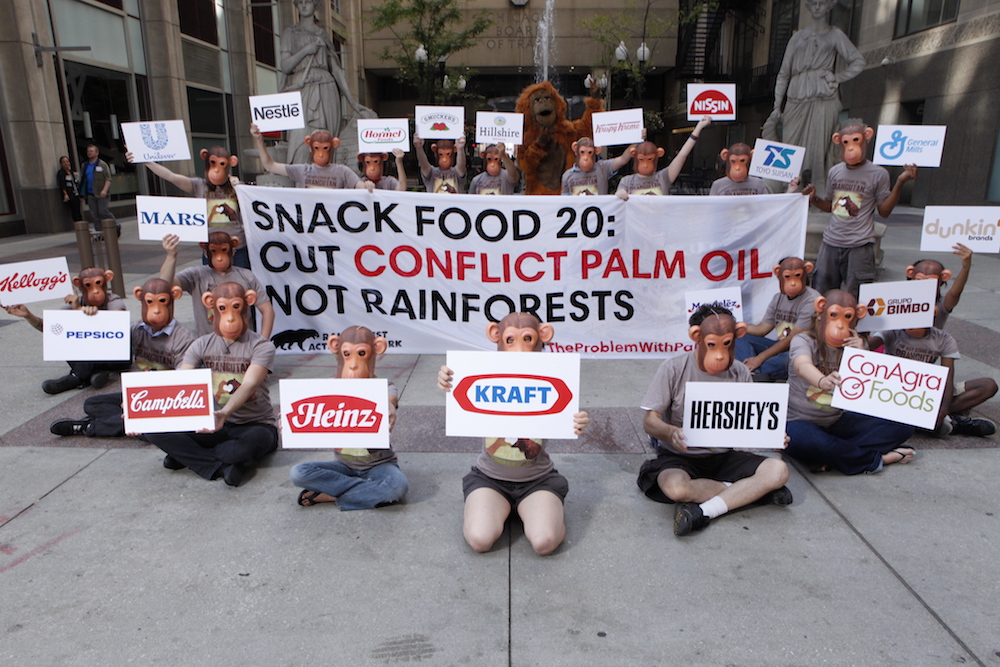 PHOTO: Donte Tatum
PHOTO: Donte Tatum
In September 2013, RAN launched our Snack Food 20 campaign, calling on globally significant snack food manufacturing companies to use their purchasing power to drive a fundamental transformation of the way palm oil is traded and produced.
“Rainforest Action Network to PepsiCo…Stop killing orangutans” – LA Times, September 13, 2013
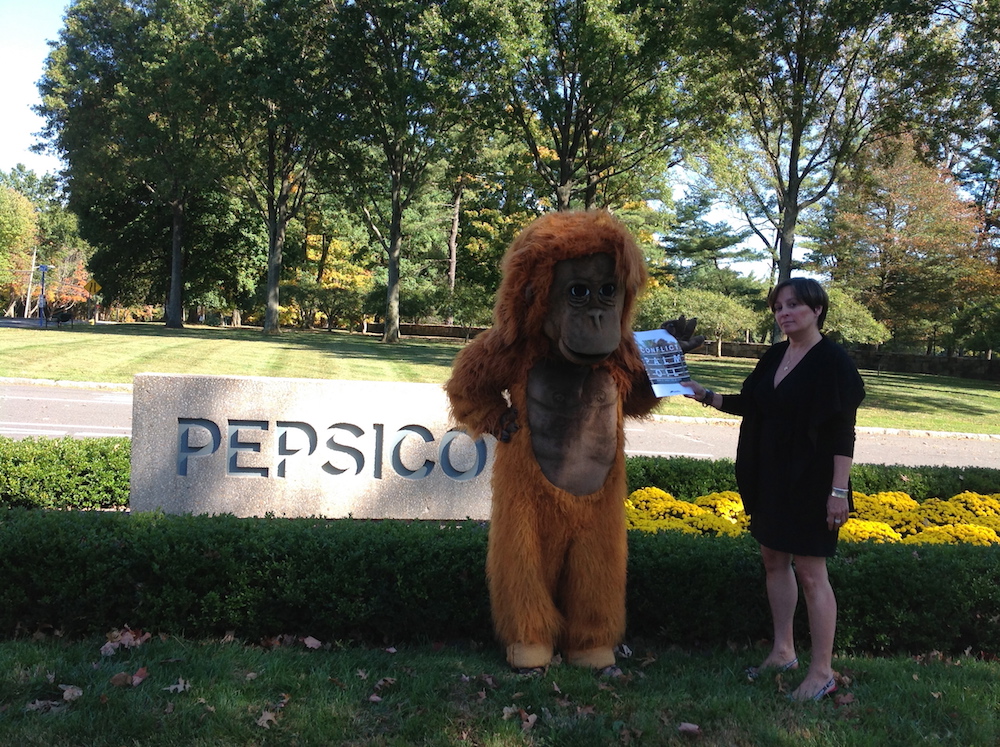 PHOTO: Rainforest Action Network
PHOTO: Rainforest Action Network
Strawberry the orangutan delivered RAN’s Conflict Palm Oil report [pdf] to a PepsiCo representative at its headquarters in Purchase, NY, in October 2013. The report outlined the problems with palm oil: rainforest destruction, species extinction, land grabbing, forced and child labor, and climate pollution, and how the supply chains of the Snack Food 20—including PepsiCo—have been driving this devastation.
2014
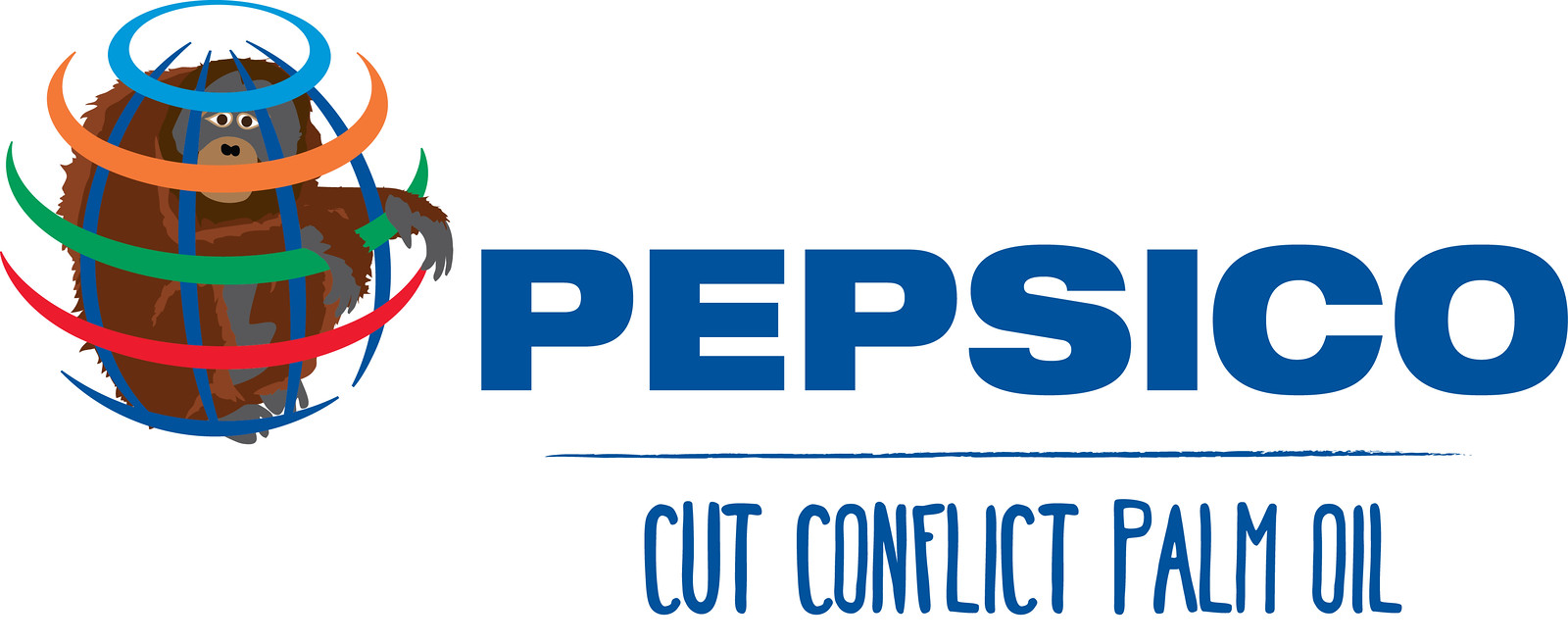
The star-studded Showtime climate series, Years of Living Dangerously, premiered in April 2014, where Harrison Ford acted as a correspondent investigating the story of how industrial palm oil production is wreaking havoc on forests, peatlands and people in Indonesia, while contributing extreme carbon pollution to the atmosphere. Tens of thousands of concerned shoppers and Showtime viewers took action online to call on PepsiCo CEO Indra Nooyi to go on the record about her company’s continued use of Conflict Palm Oil.
At this same time, RAN also announced PepsiCo as our main focus of our Snack Food 20 campaign given the company’s position as the largest globally distributed snack food company in the world, consuming more than 450,000 metric tons of palm oil annually.
“PepsiCo has fallen behind its peers by failing to raise its standards to the new global benchmark that’s been set for responsible palm oil use.” – Ginger Cassady, RAN forest program director, April 21, 2014.
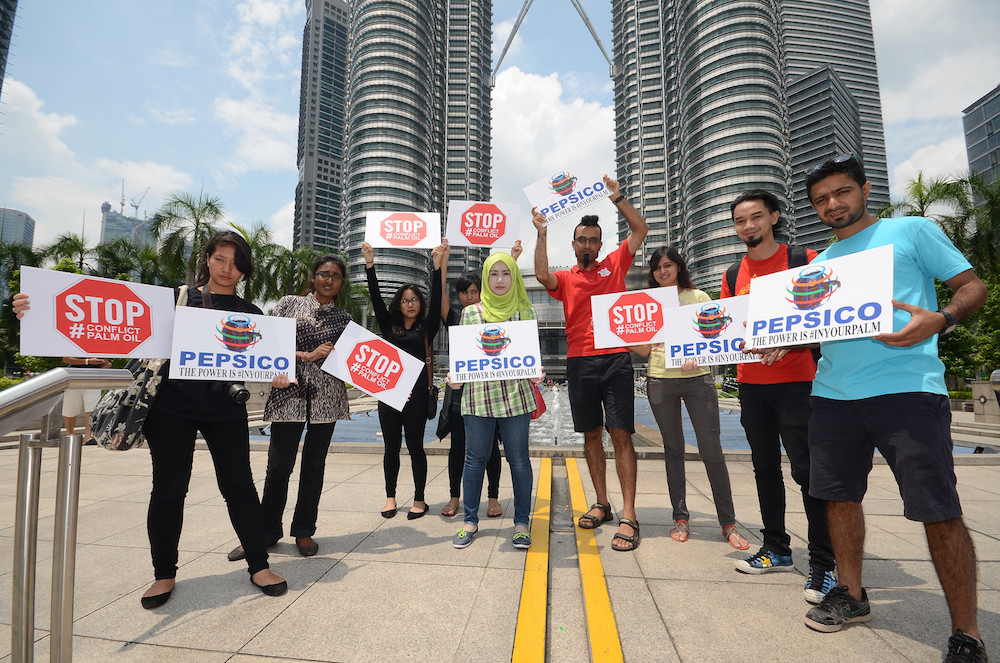
In May 2014, hundreds of events across the world called on PepsiCo to break ties to Conflict Palm Oil in a Global Day of Action. In the same month, Indonesian ally Ratri Kusumohartono, from Sawit Watch (Palm Oil Watch), attended PepsiCo’s Annual General Meeting where she spoke directly to Indra Nooyi about the impacts of Conflict Palm Oil on Indonesia’s rainforests, local communities, and workers.
Under pressure, PepsiCo made its first public palm oil pledge in May of 2014, but the commitment had critical gaps that must be addressed before it meets the global benchmark for responsible palm oil procurement.
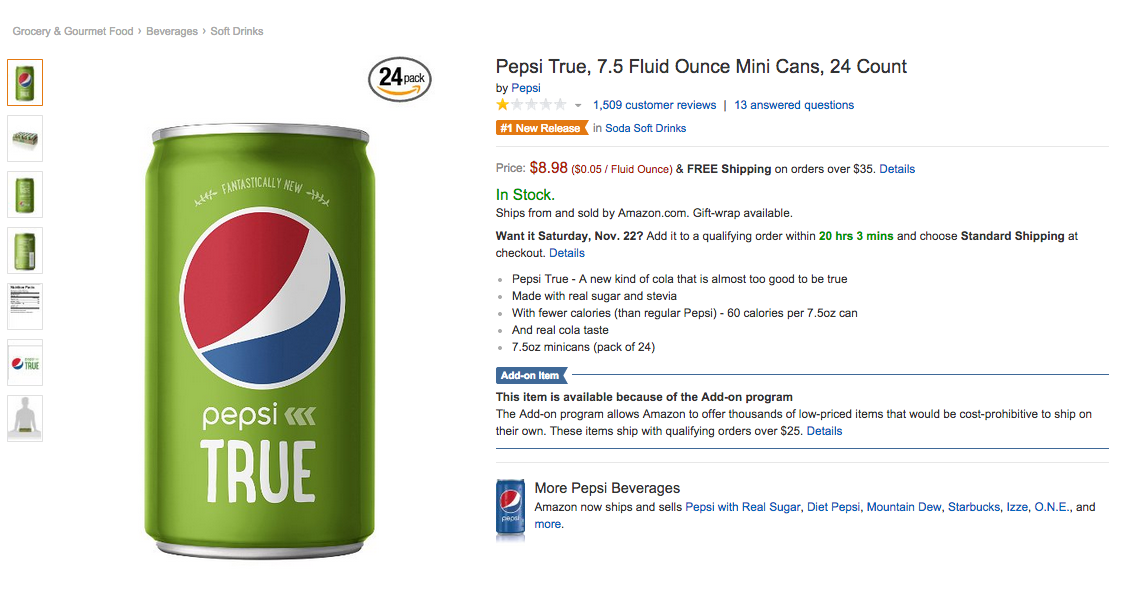
Online pressure on PepsiCo ramped up in November 2014 when activists from RAN and SumOfUs flooded the Amazon.com page used by PepsiCo to launch its new stevia drink, Pepsi True, with hundreds of 1-star negative reviews. Activists called out PepsiCo for is failure to address its irresponsible use of palm oil on review comments which made the company pull down the Amazon listing. The listing was later put back online.
2015

RAN friend SumOfUs started out 2015 with a bang when it launched a Doritos parody video calling out PepsiCo’s lax palm oil policy in January. PepsiCo responded by insisting it is committed to using sustainable palm oil; the Roundtable on Sustainable Palm Oil scheme PepsiCo is reliant upon is widely known to fall woefully short of delivering truly sustainable and conflict-free palm oil to world markets.
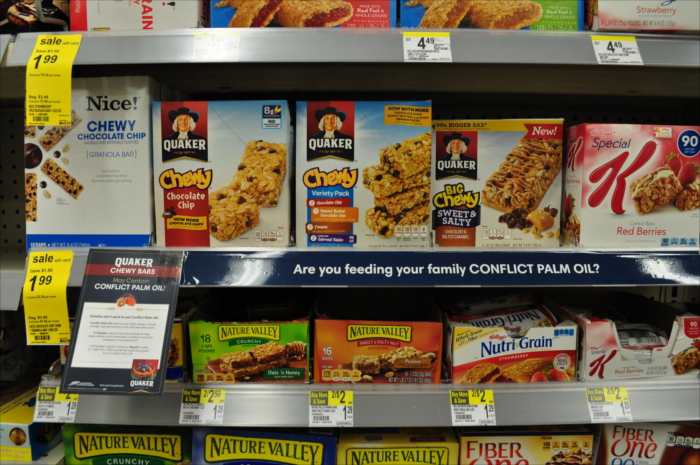
In April 2015, hundreds of activists took part in a Week of Action in grocery stores and public spaces across the United States, engaging shoppers and rebranding grocery store shelves to warn customers that products from PepsiCo’s sub-brand Quaker may contain Conflict Palm Oil.
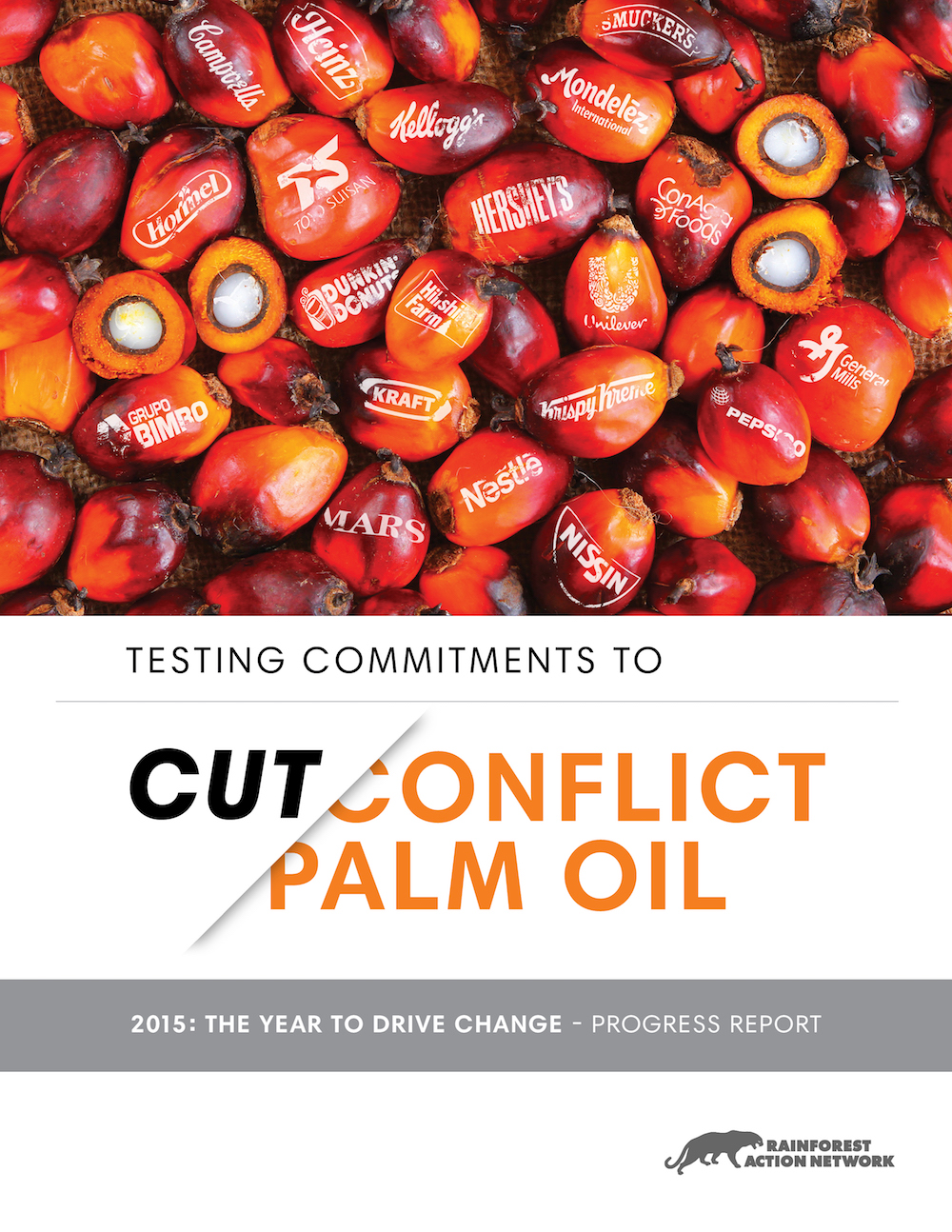
A few months later, in June 2015 RAN launched its Conflict Palm Oil progress report [pdf] and interactive Snack Food 20 scorecard, exposing how major snack food brands such as PepsiCo continue to lag behind on palm oil commitments.
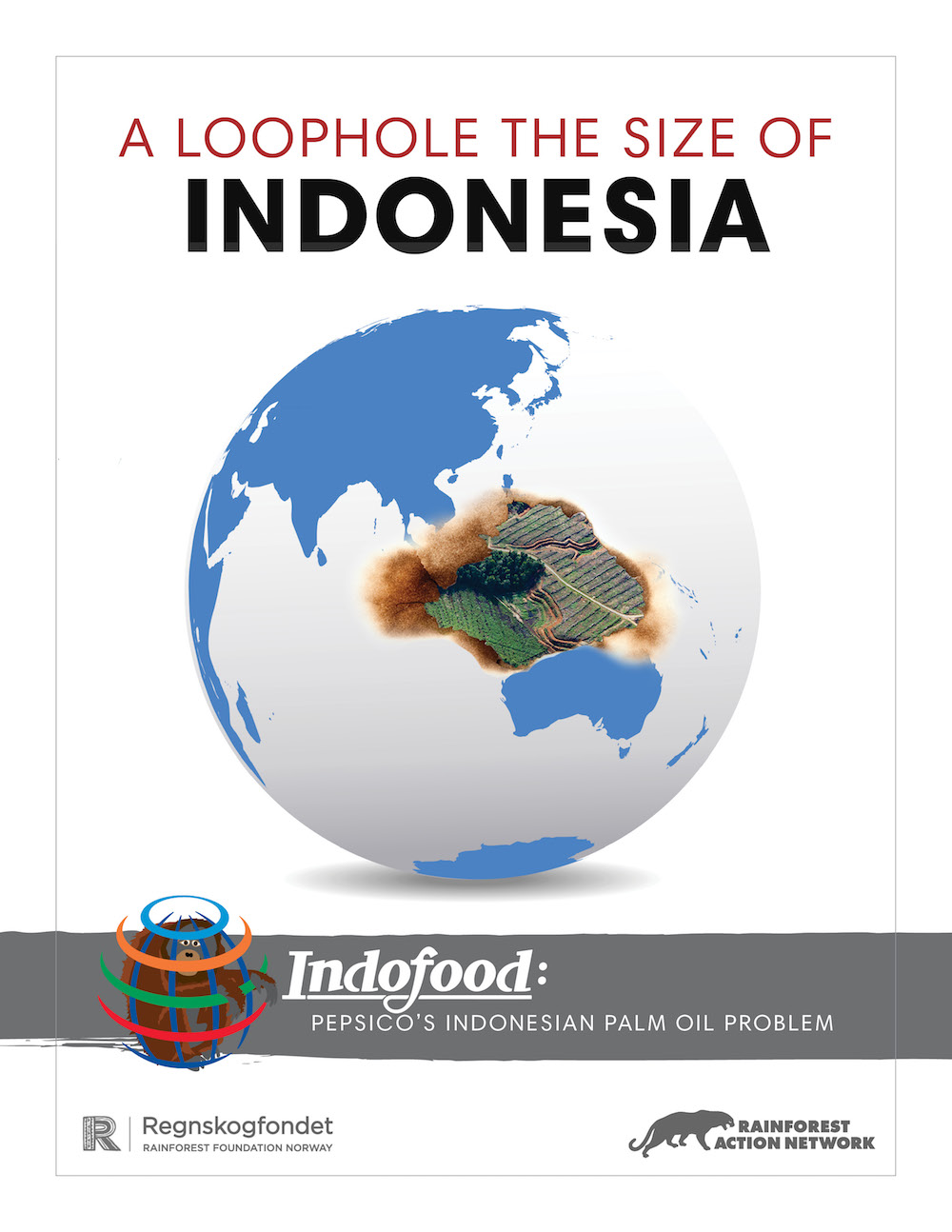
A joint report released in September 2015 by RAN and Rainforest Foundation Norway presented cases showing the sole maker of PepsiCo branded products in Indonesia—a company called Indofood—is tied up in clearing and burning of rainforests and long-standing cases of social conflict and human rights violations. Following two years of escalating public outcry over its use of Conflict Palm Oil, PepsiCo released a new palm oil policy that same week. Environmental and human rights organizations immediately labeled it as both inadequate and incomplete, in large part because it specifically excludes joint venture partner Indofood from adhering to PepsiCo’s heightened social and environmental standards for palm oil.
2016
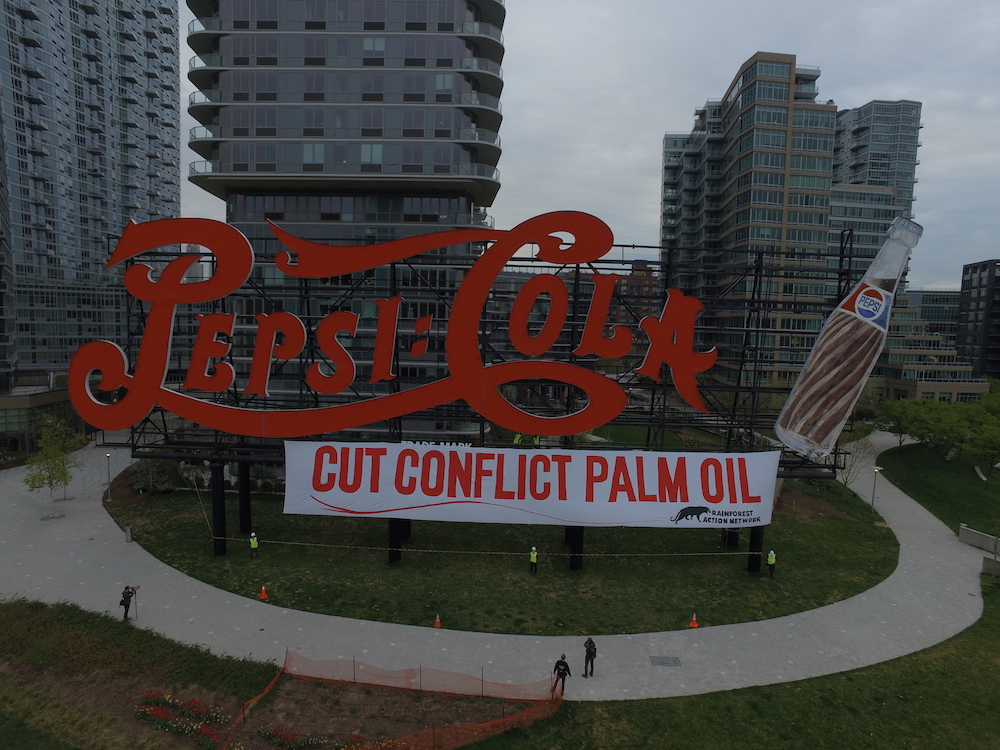 PHOTO: Daniel Feighery
PHOTO: Daniel Feighery
Protesters scaled the iconic six story NYC Pepsi landmark in April 2016 to drop a 100 foot banner demanding the snack food giant cut Conflict Palm Oil.
“Pepsi has known for over three years about major environmental and human rights violations in its palm oil supply chain, but the company has fallen short and continues to drag its feet instead of taking the kind of decisive action needed to address this urgent problem.” – Robin Averbeck, senior campaigner at RAN, April 26, 2016
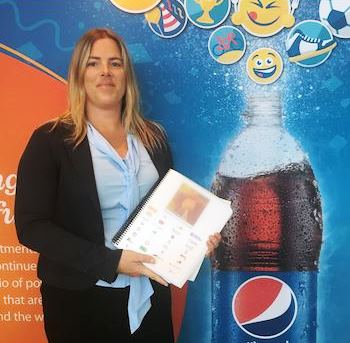
At PepsiCo’s Annual General Meeting in May 2016, RAN’s forest program director Ginger Cassady hand-delivered over 600 photo petitions to PepsiCo CEO Indra Nooyi, making sure she knows that we hold her accountable for PepsiCo’s flawed business model.
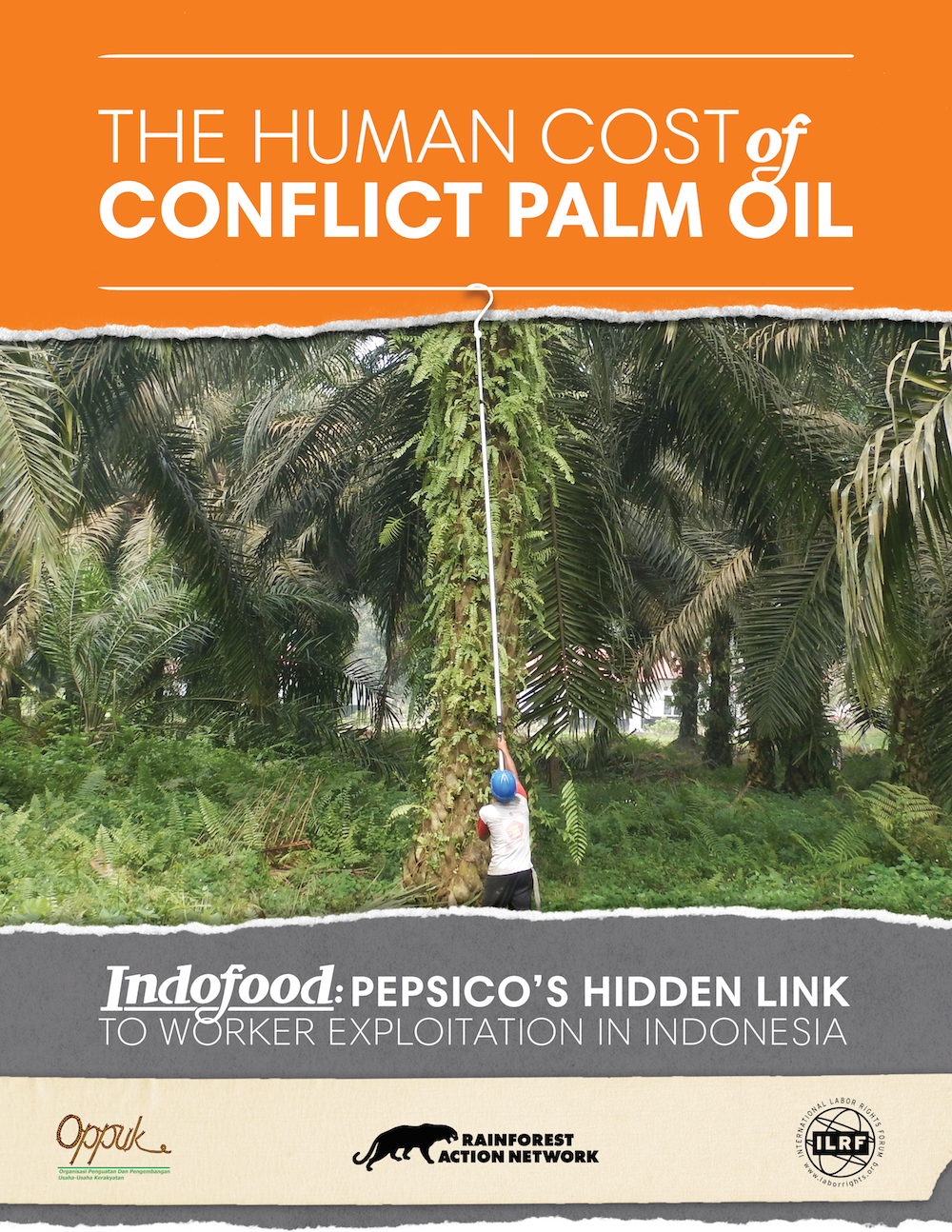
In June 2016, RAN, OPPUK—an Indonesian labor rights advocacy organization—and the International Labor Rights Forum, called out PepsiCo’s hidden link to worker exploitation in Indonesia in a video and joint report [pdf]. PepsiCo’s joint venture partner Indofood was exposed again in the report which revealed findings of child labor, poverty wages and worker exploitation on its own plantations.
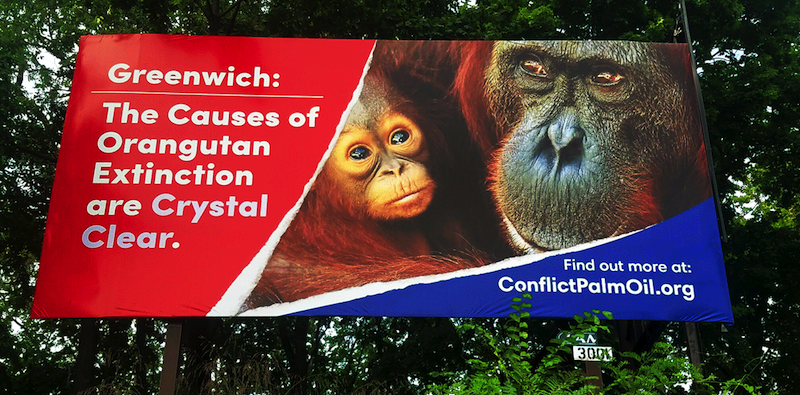
Later that summer, in August 2016, we brought our campaign to PepsiCo’s doorstep—its Global Headquarters in Purchase, NY—and increased the pressure on the company to take responsibility for its global impact. We ran a billboard for several weeks in PepsiCo CEO Indra Nooyi’s hometown that called out PepsiCo for its part in driving orangutan extinction.
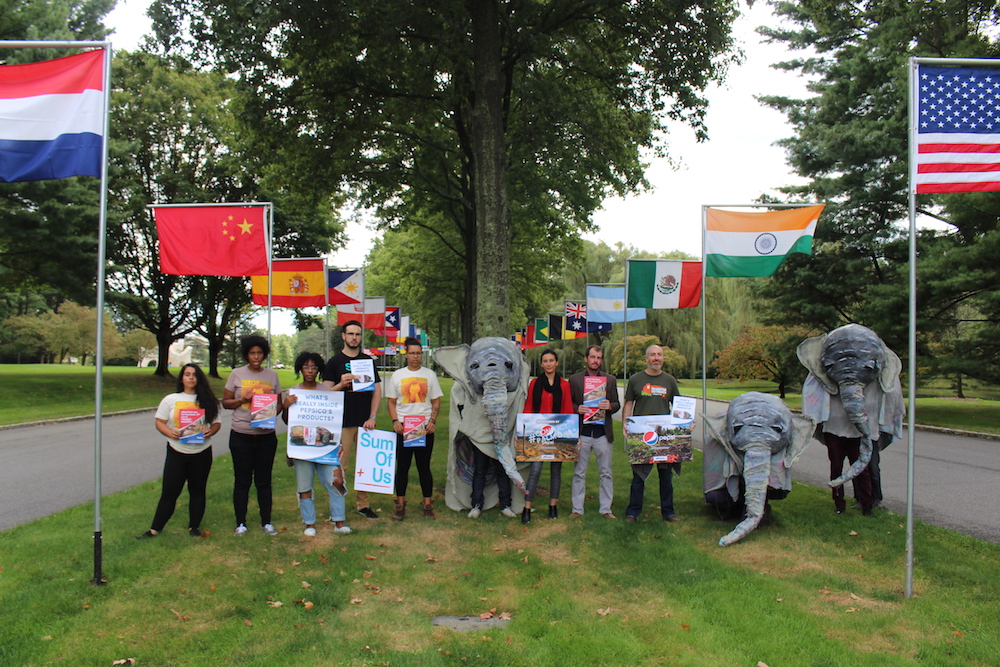
An international coalition of civil society groups including RAN, SumOfUs, Wildlife Asia, and the Oceanic Preservation Society, together with local supporters delivered a petition of a quarter million signatures to PepsiCo at its headquarters in Purchase, NY in September 2016.
2017
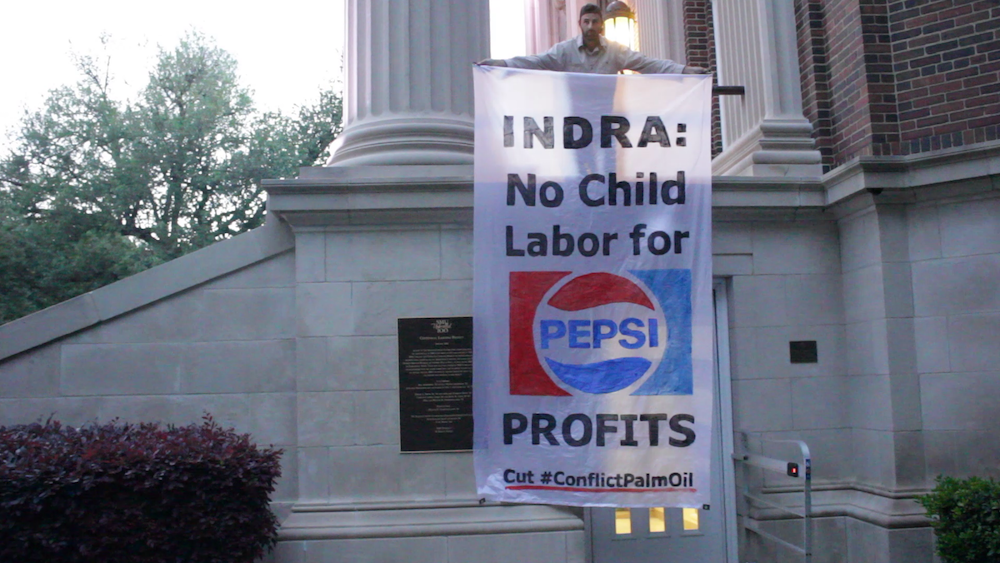
RAN released a report in April 2017 [pdf] revealing new connections between PepsiCo and the six biggest importers of palm oil into the US—each importer associated with environmental and social scandals, despite all having made commitments intended to address conflicts in their supply chains. This same month, activists crashed CEO Indra Nooyi’s speech at the Tate Lecture Series at the Southern Methodist University in Dallas, Texas. As Ms. Nooyi was speaking, activists dropped a banner in the auditorium reading: “Indra, No Child Labor For Pepsi Profits. Cut #ConflictPalmOil”.
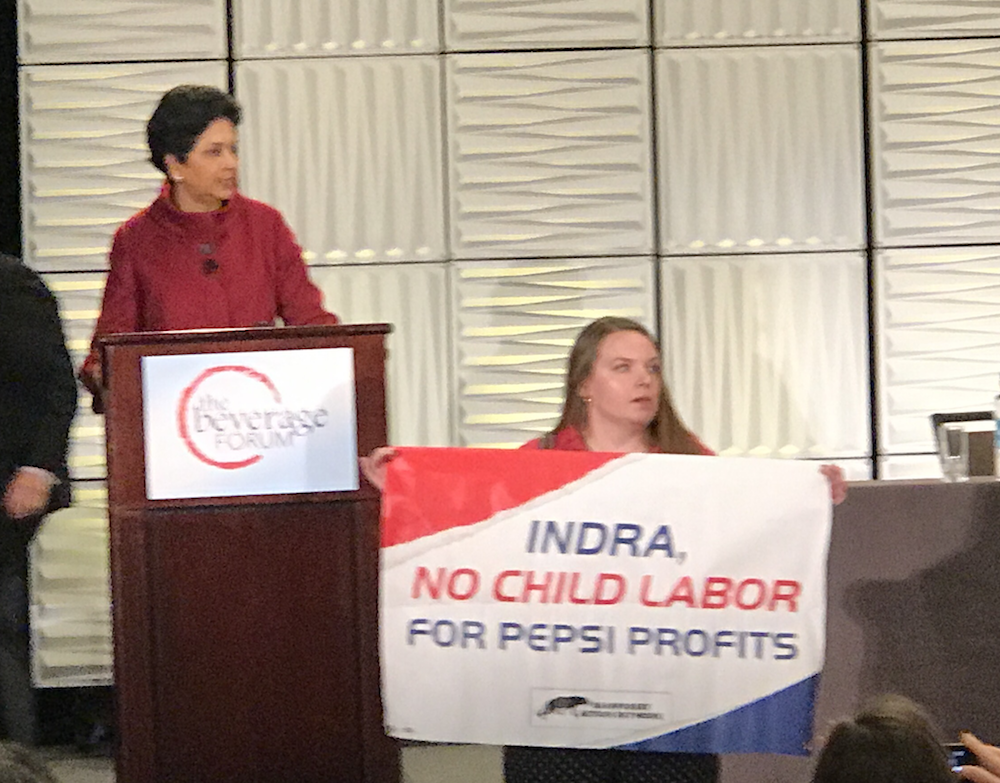
On May Day 2017, labor and human rights activists deployed a banner in front of CEO Indra Nooyi while she accepted the Beverage Forum’s lifetime achievement award. Other activists used an audio disruption of chainsaws and an audio demand for justice for plantation workers. This sent a powerful message to Indra and the crowd of conference goers.
That same month, Teamsters—the union representing PepsiCo workers—and the International Union of Food, Agricultural, Hotel, Restaurant, Catering, Tobacco and Allied Workers’ Associations (IUF) both issued letters lending support to RAN’s campaign and calling out PepsiCo for its continued inaction around labor abuses in the operations of its joint venture partner Indofood’s operations.
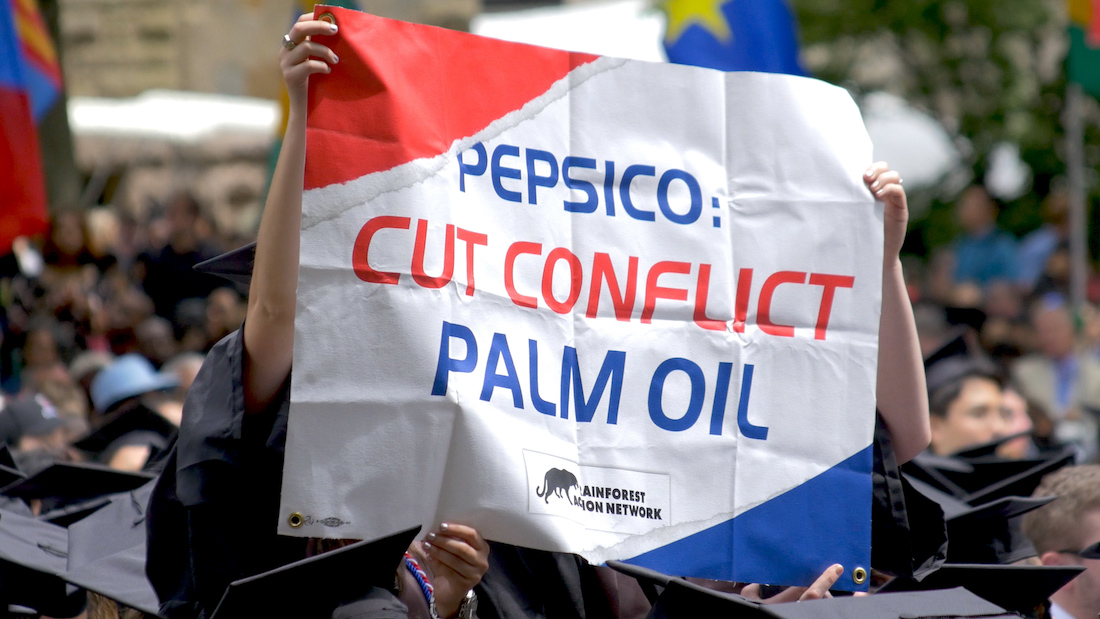
In June 2017, students of Brown University protested an honorary degree that was awarded to PepsiCo CEO Indra Nooyi for her company’s continued use of Conflict Palm Oil.
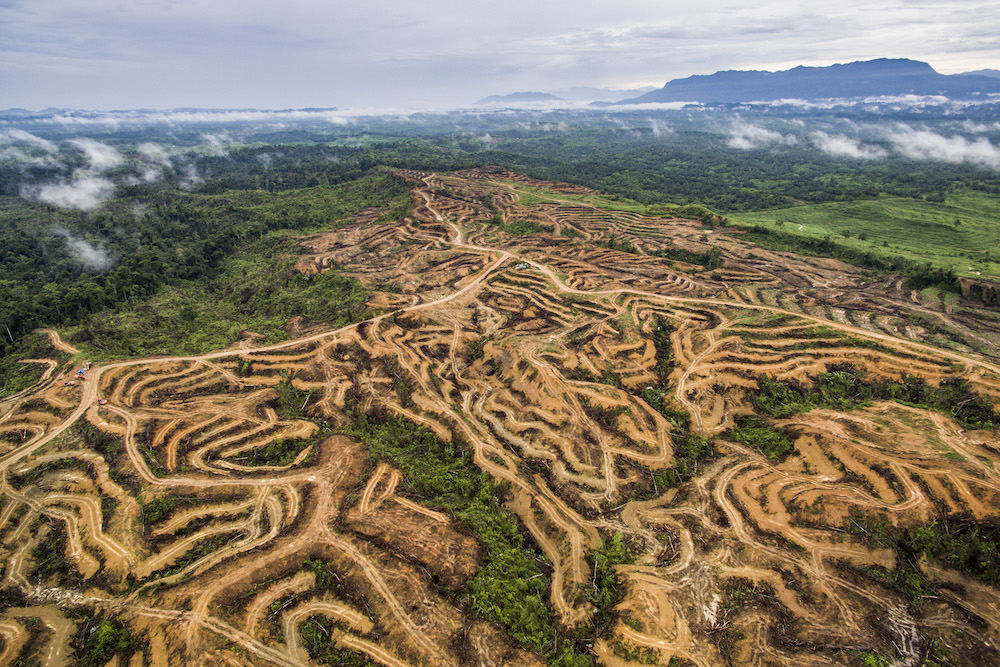 PHOTO: Nanang Sujana / RAN
PHOTO: Nanang Sujana / RAN
In July 2017, a RAN field investigation showed PepsiCo was complicit in driving the destruction of critical elephant habitat in Indonesia’s Leuser Ecosystem, one of the most important areas of rainforest still standing in Southeast Asia. A rogue palm oil producer was exposed for illegally clearing forest and RAN identified that the palm oil from this plantation was sold to major suppliers of global brands, like PepsiCo. Without meaningful action on palm oil, PepsiCo risks this destruction entering its supply chain.
“Global brands like PepsiCo can no longer hide behind paper promises and simply blame their international partners for forest crimes. The Leuser ecosystem will die a death of a thousand cuts if brands don’t start taking urgent action to address the root cause of this crisis.” – Gemma Tillack, RAN agribusiness director, July 21, 2017.
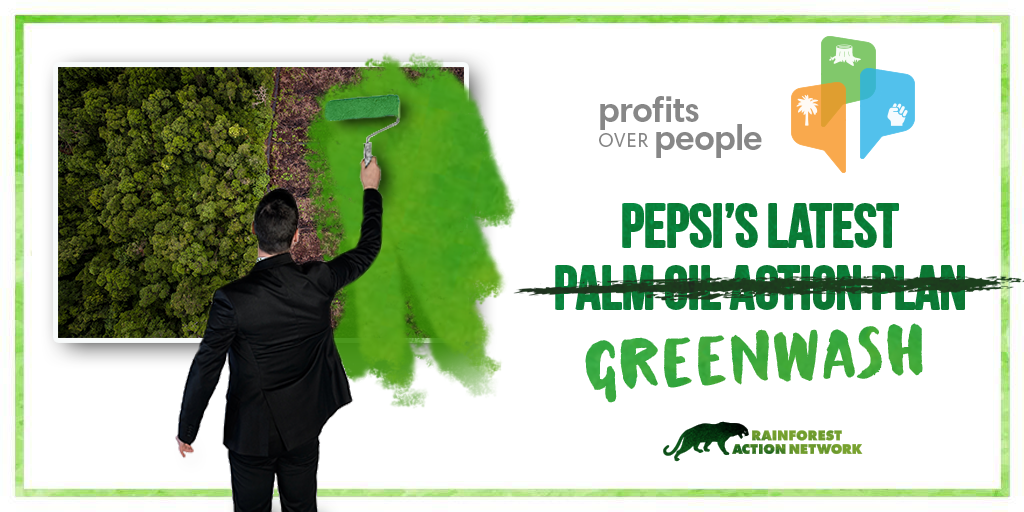
We responded to PepsiCo’s release of a “Palm Oil Action Plan Progress Report” in August 2017, in which the food and beverage giant outlines the actions it is supposedly taking to address its use of Conflict Palm Oil in PepsiCo products. RAN called out the company’s corporate greenwashing of its attempts to address Conflict Palm Oil.
“PepsiCo palm oil progress report dismissed as ‘masterful window dressing’” – Food Navigator, August 9, 2017
What’s Next?
RAN and our partners won’t stop campaigning until PepsiCo either works with Indofood to reform its Conflict Palm Oil practices or until PepsiCo ends its relationship with the egregious company. This week, we’re releasing an open letter to PepsiCo’s CEO Indra Nooyi, signed by 46 groups, including Rainforest Action Network, International Labor Rights Forum, OPPUK, Greenpeace USA, Friends of the Earth, SumOfUs and many many more. Combined, these groups represent over 25.8 million members worldwide. PepsiCo must take robust action to be a leading global snack food company. RAN expects PepsiCo to:
-
Make substantial investments into ending the use of Conflict Palm Oil in its products sold worldwide, now.
-
Require Indofood to align its policies and practices with the Free and Fair Labor Principles now, or cancel deals with the company if it does not.
-
Advance respect for human rights by requiring all suppliers and business partners to uphold the UN Guiding Principles on Business and Human Rights, and provide remedy for stolen lands and livelihoods starting with Indofood and REPSA.
-
Enforce an immediate moratorium on the destruction of forests and peatlands for palm oil.
-
Play a positive role in securing land rights, improving livelihoods and protecting forests and peatlands, including the critical Leuser Ecosystem.
Some campaigns are over in a matter of weeks or months, and some take persistence over many years. Thank you for being a part of this movement and speaking up for the world’s forests, climate, and the people and animals who depend on them!
